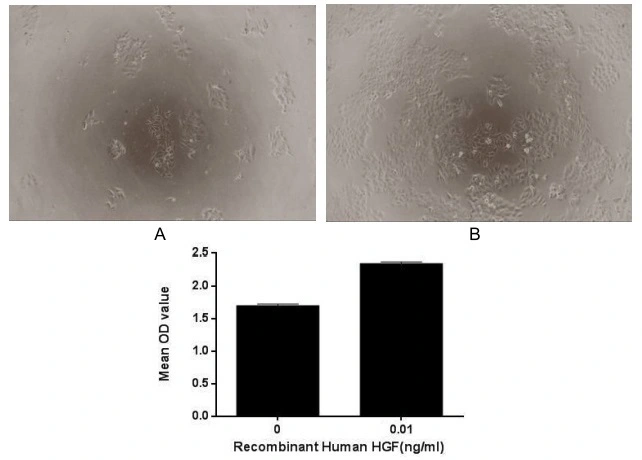HGF (human) (rec.)
AG-40T-0042
Protein IDP14210
Product group Proteins / Signaling Molecules
Overview
- SupplierAdipoGen Life Sciences
- Product NameHGF (human) (rec.)
- Delivery Days Customer10
- CertificationResearch Use Only
- Estimated Purity>95%
- Gene ID3082
- Target nameHGF
- Target descriptionhepatocyte growth factor
- Target synonymsDFNB39, F-TCF, HGFB, HPTA, SF, hepatocyte growth factor, fibroblast-derived tumor cytotoxic factor, hepatocyte growth factor (hepapoietin A; scatter factor), hepatopoietin-A, lung fibroblast-derived mitogen
- Protein IDP14210
- Protein NameHepatocyte growth factor
- Scientific DescriptionHuman hepatocyte growth factor (HGF) is synthesized as a biologically inactive single chain precursor, which is cleaved by a specific, extracellular serum serine protease to a fully active heterodimer. It stimulates the motility and invasion of several cancer cell types and can induce angiogenesis. All biological responses induced by HGF are elicited by binding to its transmembrane tyrosine kinase receptor. HGF function is essential for normal development. Knockout studies have demonstrated that both ligand and receptor deficient mice display an embryonic lethal phenotype. HGF synergizes with basic FGF in the induction of angiogenesis. HGF is a potent mitogen for mature parenchymal hepatocyte cells and is a pleiotrophic cytokine. It acts as growth factor for a broad spectrum of tissues and cell types. It has no detectable protease activity. It is an activating ligand for the receptor tyrosine kinase MET by binding and promoting its dimerization. - Protein. Human HGF (692aa). Source: Sf9 cells. Lyophilized. Purity: >90% (SDS-PAGE). Human hepatocyte growth factor (HGF) is synthesized as a biologically inactive single chain precursor, which is cleaved by a specific, extracellular serum serine protease to a fully active heterodimer. It stimulates the motility and invasion of several cancer cell types and can induce angiogenesis. All biological responses induced by HGF are elicited by binding to its transmembrane tyrosine kinase receptor. HGF function is essential for normal development. Knockout studies have demonstrated that both ligand and receptor deficient mice display an embryonic lethal phenotype. HGF synergizes with basic FGF in the induction of angiogenesis. HGF is a potent mitogen for mature parenchymal hepatocyte cells and is a pleiotrophic cytokine. It acts as growth factor for a broad spectrum of tissues and cell types. It has no detectable protease activity. It is an activating ligand for the receptor tyrosine kinase MET by binding and promoting its dimerization.
- Storage Instruction-20°C,2°C to 8°C
- UNSPSC41116100
- SpeciesHuman


